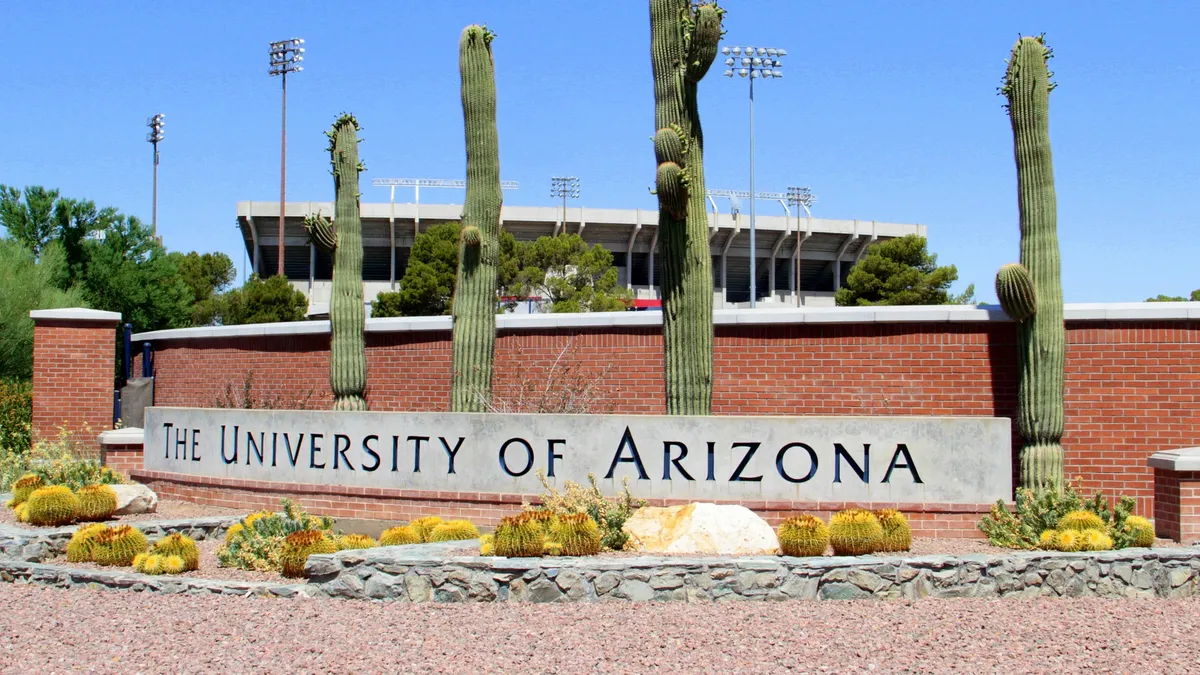Dive Brief:
- Faculty at the University of Arizona's Eller College of Management pushed back on the school's plans to purchase the for-profit Ashford University at least a month before the deal closed, according to a June letter obtained by Arizona Public Media.
- Six faculty members wrote to school officials and the board of regents calling the deal a "lemon" that would "cause irreparable damage" to U of Arizona's brand and asked them to call it off.
- The university announced earlier this week that it was creating a new entity that would buy Ashford and pay for it over time by giving the online college's parent company, Zovio, a cut of tuition revenue.
Dive Insight:
The faculty letter argues that purchasing the for-profit college would hinder U of Arizona's ability to compete in offering "high-quality" postsecondary online education and that it could hurt its relationships with current and prospective donors and faculty.
Its authors point to declining enrollment, low graduation rates and high debt among Ashford graduates, as well as ongoing litigation over its business practices, as reasons to scrap the deal.
Zovio's latest financial statements note an ongoing lawsuit from California's attorney general against Ashford alleging that it misled students. The lawsuit's outcome "is uncertain at this point," the document states. It also lists an inquiry by the Massachusetts attorney general into for-profit colleges, as well as a handful of shareholder and securities complaints. Prior to early 2019, Zovio operated as Bridgepoint Education.
In an FAQ document about the transaction shared with Education Dive earlier this week, U of Arizona stated it "will assume no responsibility for any past financial or legal liabilities." It also notes that while Ashford has a 23% retention rate and a 9% six-year graduation rate among first-time, full-time students, those figures do not include 83% of Ashford students who are transfers. Some 3,333 of Ashford's nearly 27,000 undergraduates were transfers as of the fall of 2019, according to federal data.
The university and the professors who wrote the letter did not respond to Education Dive's request for comment by publication Thursday.
The arrangement is still pending review from Ashford's accreditor and the U.S. Department of Education.
Zovio noted in SEC filings that the deal is subject to a pre-acquisition review by the department, a process that would inform the company and schools as to whether the federal body would put any restrictions on its approval, such as a letter of credit.
Closing is contingent on the department not telling the new entity or Ashford by Dec. 1 that they would have to post a letter of credit, or that U of Arizona would have to cosign on a temporary or permanent program participation agreement, for it to access Title IV funding, the filings state.
More faculty pushback followed the announcement, Inside Higher Ed reported. The publication posted a copy of the nondisclosure agreement related to the project, noting that it uses vague language and refers to Ashford and Zovio using code names. News of the deal also followed job cuts across the state flagship in response to the pandemic.
U of Arizona officials said they planned to use initial income from the deal, which includes $37.5 million paid at closing, to "help alleviate the financial burden" the institution is currently facing. The faculty letter is sympathetic to the "need for capital during these difficult and unprecedented times," but its authors contend the deal "would be a catastrophic mistake."
The arrangement is similar to that between Purdue and Kaplan universities, which faced criticism from those within Purdue. In June, the University of Massachusetts System said it planned to partner with Brandman University, a private nonprofit institution, to reach more nontraditional students online.
More public institutions are expected to consider such arrangements as they seek to expand online and reach adult learners. One 2019 report sighted 36 million people across the U.S. with some college credits but no degree.
Correction: An earlier version of this story misstated which university's accreditor needs to review the transaction. It is Ashford's.













